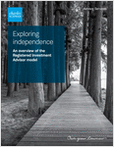What You Need to Know
- Writing a will can improve the transmission of wealth across generations, but many individuals do not have one.
- Approaching a client about writing a will is not a good idea when they are preoccupied with another complex financial transaction, research suggests.
- Financially sophisticated investors and homeowners were more likely to respond positively to financial incentives to write a will.
Legacy planning experts know the most effective way to ensure that wealth transfers go to the intended recipients is for the donor to have an enforceable will, but many Americans who could benefit from writing a will neglect to do so.
In fact, as detailed in a new report published by the Center for Retirement Research at Boston College, the percentage of households in which the head has a will is “surprisingly low,” such that, for those 50 and older, fewer than half of household heads have a will.
By age 70, the share increases to 67% overall, but the rate is much lower for less wealthy households and for Black and Hispanic households. As the authors warn, this is a big financial security issue affecting American households today — one that financial professionals can help to correct with the right approach.
The authors of the report are Alicia Munnell, director of the CRR; Jean-Pierre Aubry, associate director of state and local research; and Gal Wettstein, a senior research economist. Their work explores the deceptively simple question of when is the right time to approach clients about writing a will.
At a high level, their findings suggest that the setting of when to approach individuals about writing a will is extremely important, and that such overtures are most likely to succeed in contexts where individuals are not overly preoccupied with more immediate concerns, financial or otherwise.
Context Is King
The study used an online survey administered by researchers at the University of Chicago in which the participants were asked a series of questions about whether or not they have a will and why.
Those without a will then participated in an experiment where they were randomly assigned to one of four treatment groups to determine whether various incentives would encourage them to write a will.












 Copyright © 2024 ALM Global, LLC. All Rights Reserved.
Copyright © 2024 ALM Global, LLC. All Rights Reserved.